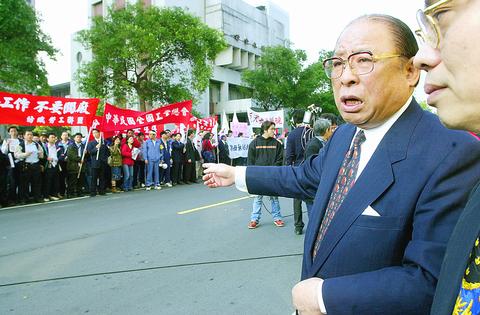Opposition lawmakers yesterday put forth a compromise measure that may end the ongoing workweek dispute.
At issue is whether Taiwan's workers will put in 44 hours of work per week beginning Jan. 1 or 84 hours per fortnight.
Lawmakers have proposed keeping the 84-hour-per-fortnight measure, but still want to allow employers the ability to negotiate with their employees to schedule longer hours.

PHOTO: CHEN CHENG-CHANG, TAIPEI TIMES
"In principle, we still stick to the 84-hour-per-fortnight measure," said Lai Shyh-bao (
Under the proposal -- which has been jointly endorsed by leaders of the KMT, People First Party and New Party caucuses -- the maximum number of hours an employee is required to work cannot exceed 84 in a two-week period.
However, the limit could be set at 88 hours over a two-week period if employers obtain union approval or if at least half of a company's workers agree. In addition, local officials in charge of labor affairs must formally approve the plan.

PHOTO: CHEN CHENG-CHANG, TAIPEI TIMES
PFP caucus spokeswoman Diane Lee (李慶安) said involving labor affairs officials would help facilitate mediation in case of a dispute.
The opposition legislators said the proposal is pending the consent of labor representatives before the measure can be passed in the next Legislative Yuan meeting on Tuesday.
While industry representatives have accepted the proposal, labor groups have yet to weigh in on the idea.
"The two sides will take the proposal back to conduct further internal discussions. We are doing our best to seek a solution that satisfies both of them," said KMT caucus whip Her Jyh-huei (
Opposition lawmakers put forth yesterday's proposal after labor groups refused to sit down to negotiate with the DPP legislative caucus, which was pushing the Executive Yuan's plan to introduce a 44-hour workweek on Jan. 1.
Worker representatives have insisted that the legislature stick to its June 16 decision to go for an 84-hour-per-fortnight measure.
Lin Huei-kwung (
Meanwhile, some workers expressed fear that if employers were offered the ability to negotiate with employees, workers who want shorter hours but lack popular support would be forced to accept a longer workweek.
"It's impossible for workers who are not organized to fight with their employers. This is like making workers accept a 44-hour workweek automatically," said Wuo Young-Ie (
But a different group of workers from the textile industry offered a different opinion at the Legislative Yuan yesterday.
These workers said because their employers have earned less money due to the slowing economy, further shortening the workweek would simply worsen the situation.
"If our factories are closed down, we will lose our jobs," one of the textile workers said.
In addition, Academia Sinica President Lee Yuan-tseh (
Lee said because employee paychecks won't decline after the workweek is shortened to 84 hours per fortnight from 48 hours per week today -- a 4.5 percent reduction -- Taiwan firms would need to increase productivity by 20 percent.
If a company fails to boost productivity, bankruptcy will result and workers will become jobless, Lee warned.

ACTION PLAN: Taiwan would expand procurement from the US and encourage more companies to invest in the US to deepen bilateral cooperation, Lai said The government would not impose reciprocal tariffs in retaliation against US levies, President William Lai (賴清德) said yesterday, as he announced five strategies to address the issue, including pledging to increase Taiwanese companies’ investments in the US. Lai has in the past few days met with administrative and national security officials, as well as representatives from various industries, to explore countermeasures after US President Donald Trump on Wednesday last week announced a 32 percent duty on Taiwanese imports. In a video released yesterday evening, Lai said that Taiwan would not retaliate against the US with higher tariffs and Taiwanese companies’ commitments to

‘SPECIAL CHANNEL’: Taipei’s most important tasks are to stabilize industries affected by Trump’s trade tariffs and keep negotiations with Washington open, a source said National Security Council Secretary-General Joseph Wu (吳釗燮) arrived in the US for talks with US President Donald Trump’s administration, a source familiar with the matter said on Friday. Wu was leading a delegation for a meeting known as the “special channel,” the Financial Times reported earlier. It marked Trump’s first use of the channel since returning to the White House on Jan. 20. Citing a source familiar with the matter, the Financial Times reported that Minister of Foreign Affairs Lin Chia-lung (林佳龍) was also a part of the delegation. The visit came days after China concluded war games around Taiwan and amid Trump’s

Intelligence agents have recorded 510,000 instances of “controversial information” being spread online by the Chinese Communist Party (CCP) so far this year, the National Security Bureau (NSB) said in a report yesterday, as it warned of artificial intelligence (AI) being employed to generate destabilizing misinformation. The bureau submitted a written report to the Legislative Yuan in preparation for National Security Bureau Director-General Tsai Ming-yen’s (蔡明彥) appearance before the Foreign Affairs and National Defense Committee today. The CCP has been using cognitive warfare to divide Taiwanese society by commenting on controversial issues such as Taiwan Semiconductor Manufacturing Co’s (TSMC, 台積電) investments in the

HELPING HAND: The steering committee of the National Stabilization Fund is expected to hold a meeting to discuss how and when to utilize the fund to help buffer the sell-off The TAIEX plunged 2,065.87 points, or 9.7 percent, to close at 19,232.35 yesterday, the highest single-day percentage loss on record, as investors braced for US President Donald Trump’s tariffs after an extended holiday weekend. Amid the pessimistic atmosphere, 945 listed companies led by large-cap stocks — including Taiwan Semiconductor Manufacturing Co (TSMC, 台積電), Hon Hai Precision Industry Co (鴻海精密) and Largan Precision Co (大立光) — fell by the daily maximum of 10 percent at the close, Taiwan Stock Exchange data showed. The number of listed companies ending limit-down set a new record, the exchange said. The TAIEX plunged by daily maxiumu in just